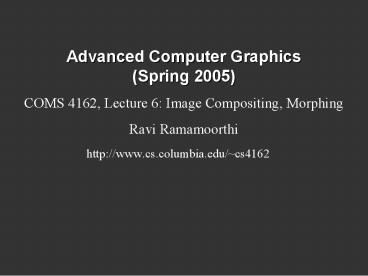Advanced Computer Graphics Spring 2005 - PowerPoint PPT Presentation
1 / 35
Title:
Advanced Computer Graphics Spring 2005
Description:
1996: Academy scientific and engineering achievement award (oscar ceremony) 'For ... Technical Academy Awards 96. Scientific and Engineering Achievement Award ... – PowerPoint PPT presentation
Number of Views:68
Avg rating:3.0/5.0
Title: Advanced Computer Graphics Spring 2005
1
Advanced Computer Graphics
(Spring 2005)
- COMS 4162, Lecture 6 Image Compositing,
Morphing - Ravi Ramamoorthi
http//www.cs.columbia.edu/cs4162
2
To Do
- Assignment 1, Due Feb 15.
- This week only extra credit and clear up
difficulties - Questions/difficulties so far in doing
assignment?
3
Digital Image Compositing
- 1996 Academy scientific and engineering
achievement award (oscar ceremony) For their
pioneering inventions in digital image
compositing
4
Image Compositing
- Separate an image into elements
- Each part is rendered
separately - Then pasted together or
composited into a scene
Many slides courtesy Tom Funkhouser
5
Outline
- Compositing or combining images
Fundamental problem in graphics images from
different sources, put them together - Blue screen matting
- Alpha channel
- Porter-Duff compositing algebra (Siggraph 84)
- Morphing (Beier-Neely, Siggraph 92)
17.6 in textbook covers some aspects, but not all
6
Blue Screen Matting
- Photograph or create image of object against blue
screen (blue usually diff from colors like skin) - The extract foreground
(non-blue pixels) - And add (composite) to new
image - Problem aliasing hair
(no notion
of partial
coverage/blue)
7
Outline
- Compositing or combining images
Fundamental problem in graphics images from
different sources, put them together - Blue screen matting
- Alpha channel
- Porter-Duff compositing algebra (Siggraph 84)
- Morphing (Beier-Neely, Siggraph 92)
17.6 in textbook covers some aspects, but not all
8
Alpha Channel
- In general, 32 bit RGBa images
- Alpha encodes coverage (0transparent, 1opaque)
- Simple compositing
9
Alpha Channel
10
Pixels with Alpha Conventions
- Premultiplication
- Color C (r,g,b) and coverage alpha is often
represented as - One benefit color components aF directly
displayed - What is ( a , C ) for the following?
- (0, 1, 0, 1) Full green, full coverage
- (0, ½ , 0, 1) Half green, full coverage
- (0, ½, 0, ½) Full green, half (partial)
coverage - (0, ½, 0, 0) No coverage
11
Compositing with Alpha
12
Opaque Objects
- In this case, a controls the amount of pixel
covered (as in blue screening). - How to combine 2 partially covered pixels? 4
possib. outcomes.
13
Outline
- Compositing or combining images
Fundamental problem in graphics images from
different sources, put them together - Blue screen matting
- Alpha channel
- Porter-Duff compositing algebra (Siggraph 84)
- Morphing (Beier-Neely, Siggraph 92)
17.6 in textbook covers some aspects, but not all
14
Compositing Algebra
- 12 reasonable combinations (operators)
15
Computing Colors with Compositing
- Note that coverages shown previously only
examples - In practice, we only have a, not exact coverage,
so we assume coverages of A and B are
uncorrelated - Question is how to compute net coverage for
operators previously?
16
Example C A over B
17
Image Compositing Example
Jurassic Park 93
18
Technical Academy Awards 96
- Scientific and Engineering Achievement Award
- Alvy Ray Smith, Ed Catmull, Thomas Porter, Tom
Duff for their pioneering inventions in
digital image compositing - Technical Achievement Award
- Computer Film Co. For their pioneering efforts in
the creation of the CFC digital film compositing
system - Gary Demos, David Ruhoff, Can Cameron, Michelle
Feraud for their pioneering efforts in the
creation of the Digital Productions digital film
compositing system - Douglas Smythe, Lincoln Hu, Douglas S. Kay,
Industrial Light and Magic Inc. for their
pioneering efforts in the creation of the ILM
digital film compositing system
19
Outline
- Compositing or combining images
Fundamental problem in graphics images from
different sources, put them together - Blue screen matting
- Alpha channel
- Porter-Duff compositing algebra (Siggraph 84)
- Morphing (Beier-Neely, Siggraph 92)
17.6 in textbook covers some aspects, but not all
20
Examples
- Famous example Michael Jackson Black and White
Video (circa 1991). - Unfortunately, I couldnt find a version of this
- Easy enough to implement assignment in many
courses (we show example from CMU course) - No music, but the good poor mans alternative
21
Examples
22
Simple Cross-Dissolve
23
The idea in morphing
- User marks line segments
- These are used to warp image 1 and image 2
- Images are then blended
- Key step is warping
- Why is it needed? Why not just cross-dissolve or
blend two images based on alpha (how far between
them) - How is it to be done with line segments?
24
Beier-Neely examples
25
(No Transcript)
26
Feature-Based Warping
- To warp image 1 into image 2, we must establish
correspondence between like features - Then, those features transform (and rest of image
moves with them) - In Beier-Neely, features are user-specified line
segments (nose, face outline etc.) - Warping is an image transformation (generally
more complex than scale or shift, but same basic
idea) - Morphing takes two warped images and
cross-dissolves
27
Warping with Line Segments
- We know how line warps, but what about whole
img? - Given p in dest image, where is p in source
image?
28
Warping with one Line Pair
- What happens to the F?
Translation!!
29
Warping with one Line Pair
- What happens to the F?
Similar ideas apply to rotation,
other similarity transforms
30
Warping with Multiple Line Pairs
31
Details
32
Weighting effect of each line pair
33
Warping Pseudocode
34
Morphing Pseudocode
35
Examples































